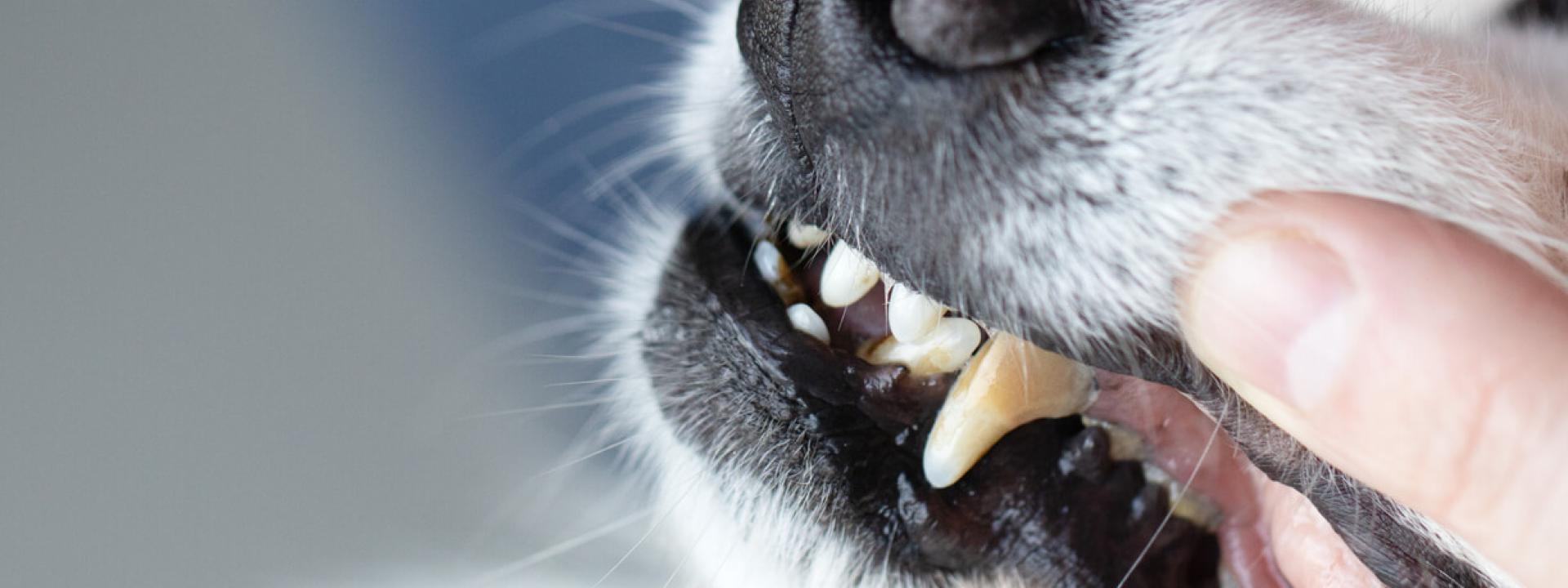Pet dental health is very important for your pet’s overall health and longevity. Although cavities are less common in pets than in people, they can have many of the same dental problems that people can develop.
Pet Dental Health Month
February is National Pet Dental Health Month. The AVMA created this month-long event to help raise awareness and promote the importance of pet dental health. Sometimes a problem is difficult to notice, and you find it when it’s too late, with your pet already in discomfort to the point where they have stopped eating.
Why Dental Health is Important
Proper dental care will help keep your pet from developing a wide variety of dental health issues, such as periodontal disease caused by bacteria buildup in the mouth. These bacteria form a film over the teeth called plaque.
As the bacteria die, they can become calcified by the calcium in your pet’s saliva. The calcified plaque is called tartar, and it can eventually lead to gingivitis, which can lead to an infection in the root of the tooth. In the late stages of periodontal disease, the tissues around the tooth are destroyed, and the socket that holds the tooth in place erodes, making the tooth loose.
Another common dental problem is broken teeth. Chewing on hard toys and treats like antlers and bones can break your dog or cat’s teeth. A broken tooth can expose the tooth's nerve, which is very painful for your pet. Additionally, the exposed nerve can become infected and cause even more problems for your pet. At this point, the tooth will need to be removed.
Those issues are bad enough on their own, but some veterinary research suggests that periodontal disease in pets is linked with diseases of the organs, too, particularly in the liver, kidneys, and heart.
Signs of Pet Dental Problems
Regardless of any problems, your pet’s teeth should be checked at least once a year by your veterinarian for early signs of a problem and to keep your pet’s mouth healthy.
Have your pet’s teeth checked sooner if you observe any of the following problems:
- Bad breath
- Broken or loose teeth
- Extra teeth or retained baby teeth
- Teeth that are discolored or covered in tartar
- Abnormal chewing, drooling, or dropping food from the mouth
- Reduced appetite or refusal to eat
- Pain in or around the mouth
- Bleeding from the mouth
- Swelling in the areas surrounding the mouth
Some pets become irritable when they have dental problems, and any changes in your pet’s behavior should prompt a visit to your veterinarian. Be careful when checking your pet’s mouth because pain can cause a pet to react aggressively.
Pet Dental Care at Home
In between bringing your animal to the veterinarian for dental care, you can do some things to help at home.
- Brush their teeth. Brushing your pet’s teeth may seem extreme, but it is hugely beneficial for them. In an ideal world, you would brush their teeth twice a day. If you can’t manage twice a day, you should do it as often as you can. As a note, never use your toothpaste on them.
There are toothpastes made for pets that come in different pet flavors such as poultry, seafood, and beef. There are also plaque prevention gels.
Note: brushing a dog or cat's teeth is not the same as brushing your own teeth. Here is a great video from the AVMA on brushing your pet's teeth.
- Use tooth wipes. Tooth wipes are a faster and easier solution than brushing their teeth, although slightly less effective.
- Give them dental treats/chews. There are many treats and chew toys that you can buy for your pet that help remove plaque and improve dental health. If you are unsure what you should get for your pet, consult with your veterinarian.
We carry many dental products you can order direct from our on-line pharmacy. If you are not sure which products are best for your pet, ask us, we’ll be glad to help.
Professional Pet Dental Care
Professional pet dental care involves an examination, X-rays, and a teeth cleaning by a trained veterinarian. Our veterinarians are experienced in preventing, locating, and treating any issues that might go unnoticed by even the most dedicated pet owner. It is best to do what you can at home and also include professional dental care for your pet.
Feline Juvenile Gingivitis
Feline juvenile gingivitis refers to inflammation of the gums that occurs following the eruption of the permanent teeth. This condition is most frequently observed in kittens with oriental breeds. Patients suffering from juvenile gingivitis have redness, swelling, and inflammation of their gum tissue (gingiva). The cause of this disease is not known but an exaggerated inflammatory response to tooth eruption, immune-mediated and viral exposure (FIV, FeLV, Calicivirus) have all been proposed as triggers, many authors believe it is likely a multifactorial response.
Untreated juvenile gingivitis can lead to juvenile periodontitis. In this case, pockets between the gums and teeth may form, providing more space for bacteria to accumulate near the bone. With this additional buildup, the immune system goes into overdrive, attacking the teeth and gums and causing bone loss.
See your veterinarian as soon as possible for treatment if you suspect that your kitten is suffering from juvenile gingivitis.
February Special Dental Discounts!
Schedule your pet’s dental cleaning during the month of February and receive 10% off! Don’t know if your pet needs a dental cleaning? Call us to set up a FREE dental exam. Our technicians will determine what level of a cleaning they will need and give you an estimate of cost.
All our dental products will be 10% off during the month of February as well! Stop in and stock up on those items or order direct from us on-line.
Contact us to set up a FREE dental exam now.
Sincerely,
Dr. Tammy Stevenson

